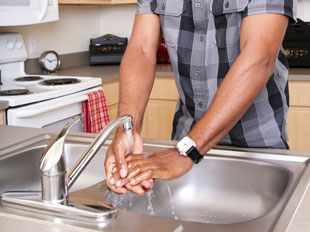Sane Sanitization
 Nobody argues the importance of proper hygiene. But while scouring the home with disinfectants and sterilizing your hands with potent cleansers may kill germs, a certain key ingredient could be harming your health.
Nobody argues the importance of proper hygiene. But while scouring the home with disinfectants and sterilizing your hands with potent cleansers may kill germs, a certain key ingredient could be harming your health.
The FDA announced concern over triclosan, a chemical found in many products — including hand soaps, toothpastes, cosmetics, and even children’s toys.
Evidence from animal studies suggests the agent could disrupt hormone function in humans, causing developmental problems. Experts also worry that the microbial combatant — found no more effective in preventing infection than regular soap and water — may actually weaken the immune system’s illness–fighting ability. And it could be to blame for the increase in antibiotic–resistant strains.
- Look for triclosan or triclocarbon on labels. Be wary of products that claim to be antibacterial, fight odors, or extend freshness, as they could contain the harmful ingredient. Items that commonly fall into this category are cutting boards, bath towels, hand soap and dishwashing liquids, deodorant, toothbrushes, shower curtains, kitchenware, and sponges.
- Ditch the antibacterial soaps altogether. The American Medical Association advises using plain old–fashioned suds when washing your hands.
- Try vinegar to reduce microbial proliferation in bathrooms and kitchens. Studies confirm the acidic nature of vinegar kills most molds, viruses, and bacteria without the side effects of chemical products.

